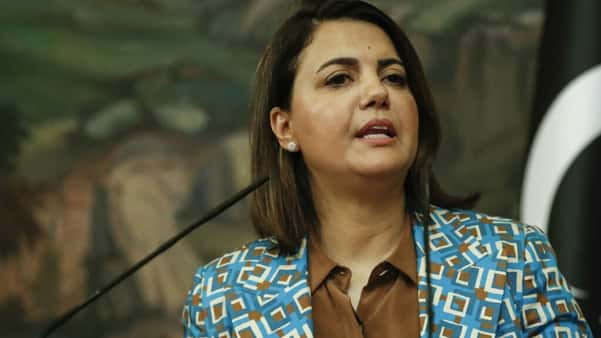PASSAGE OF THE DAY: "Usually, details of IG investigations are kept secret until a final report is issued. However, the work of the crime lab, which up until recently was responsible for testing all DNA, ballistics, fingerprint and digital evidence connected to crimes in the city, is tied to the D.C. court system, meaning some information about the probe is trickling out in publicly available court filings. “These documents are deeply alarming. They show that the prior DFS management adopted a practice designed to undermine our ability to investigate and challenge shaky evidence on behalf of our clients,” said Jessica Willis, special counsel for forensics for the D.C. Public Defender Service, in a statement provided to WTOP. “With all the name-calling and finger-pointing that went on between the lab and the prosecutors, it’s easy to lose sight of who really loses out when these systems break down: people locked up at the D.C. Jail who are waiting for their day in court,” Willis said, referring to an acrimonious back-and-forth over the past year and a half between the U.S. Attorney’s Office and the crime lab. “We know that faulty forensic evidence is a leading cause of wrongful convictions, and one way to protect against this risk is a rigorous and transparent quality assurance program.""
------------------------------------------------------------------
STORY: "IG (Office of The Inspector General) investigation probes whether DC crime lab tried to keep information from defence attorneys," by Reporter Jack Moore, published by WTOP, which has been following this story intensely, on October 14, 2021.
GIST: "It started with a ballistics error in a murder case, then spiraled into allegations that managers at the D.C. Department of Forensic Sciences deliberately concealed conflicting findings to minimize the mistake.
Documents reviewed by WTOP indicate a sprawling criminal investigation being carried out by the D.C. Office of the Inspector General, probing the D.C. crime lab’s quality-control system amid allegations the agency systematically removed the names of analysts from some documents — a move which one former supervisor at the agency said was made to prevent defense attorneys from calling those analysts to testify about mistakes listed in the documents.
That former supervisor also outlined for investigators what she described as a broader effort by lab leadership to bury some Quality Corrective Action Reports, or QCARs, that looked “really bad” for the agency.
For example, one of those reports, the ex-supervisor told investigators, involved two vials of Yersinia pestis — the bacteria that causes bubonic plague — that had been ordered by the department’s Public Health Laboratory in 2015 for testing purposes and then went unaccounted for possibly due to a barcode-scanning issue. The missing vials triggered a QCAR, but when the supervisor went looking for the report a few years later to see how it was resolved, the report had also disappeared, she told investigators.
Investigators have not independently verified the supervisor’s account.
Usually, details of IG investigations are kept secret until a final report is issued. However, the work of the crime lab, which up until recently was responsible for testing all DNA, ballistics, fingerprint and digital evidence connected to crimes in the city, is tied to the D.C. court system, meaning some information about the probe is trickling out in publicly available court filings.
“These documents are deeply alarming. They show that the prior DFS management adopted a practice designed to undermine our ability to investigate and challenge shaky evidence on behalf of our clients,” said Jessica Willis, special counsel for forensics for the D.C. Public Defender Service, in a statement provided to WTOP.
“With all the name-calling and finger-pointing that went on between the lab and the prosecutors, it’s easy to lose sight of who really loses out when these systems break down: people locked up at the D.C. Jail who are waiting for their day in court,” Willis said, referring to an acrimonious back-and-forth over the past year and a half between the U.S. Attorney’s Office and the crime lab. “We know that faulty forensic evidence is a leading cause of wrongful convictions, and one way to protect against this risk is a rigorous and transparent quality assurance program.”
Responding to several questions via email Wednesday, a DFS spokesman told WTOP, “The decision to omit employee names from QCARs dates back to 2017 and is common practice among laboratories.”
The spokesman said the shift in policy was discussed in several public meetings of the Science Advisory Board, which advises lab leadership, and the “intent of a QCAR is to address issues and to learn from them in order to improve operations.”
The spokesman added, “DFS is evaluating the current practice,” under Interim Director Anthony Crispino, who was appointed to temporarily lead the agency in May.
Regarding the claim that former lab leadership wanted to remove “really bad” QCARs, such as the loss of vials alleged by the former supervisor, the spokesman said: “Our priority is ensuring the integrity of the science, following the established processes for accountability, and providing quality customer service. The incident described predates current leadership.”
Speaking at a D.C. Council oversight roundtable Thursday, Crispino called it a “unsubstantiated reporting” and that the public health lab is regularly inspected by federal authorities. “This work has been conducted with zero risk to public health or safety, as confirmed by the most recent federal inspection, that was conducted last month.” He added later,” There is no imminent and there never was any imminent risk to health or public safety, I can assure you that.”
Meanwhile, the Public Defender Service, which represents people charged in D.C. courts who cannot afford to hire attorneys, is calling on the D.C. Council to rewrite the legislation creating the forensic lab “focused on strengthening these oversight structures because they are necessary to make DFS a truly independent, science-oriented forensic lab,” Willis said.
What are QCARs?
Forensic experts stress that mistakes are unavoidable — examiners are human, after all. QCARs are a key part of the D.C. lab’s processes for finding and responding to errors. The lab’s Departmental Operations Manual says the lab is required to generate a QCAR whenever a significant “nonconformity” is discovered, such as expired reagents, improperly handled or contaminated evidence, or errors in reports.
DFS’s written policies, which are posted online, say that QCARs should “include all information regarding the event,” including the “parties involved” and possible impacts. QCARs are also supposed to include “an in-depth investigation” into what caused the error.
The lab, prosecutors and defense attorneys, especially the D.C. Public Defender Service, have been in pitched legal battles in D.C. Superior Court for years over the extent to which QCARs must be turned over to defense attorneys during the discovery process in criminal trials.
In the view of many defense lawyers, the quality documents are a potential treasure trove of material that could be helpful in preparing a defense, especially if the files contain evidence of shoddy work in past cases.
More importantly, defense attorneys argue, the constitutional right to a fair trial demands that such information be disclosed, because it could contain exculpatory information or impeach the testimony of prosecution witnesses.
But DFS long resisted disclosing the quality reports in specific cases, arguing that the files are not supposed to be punitive and, because they document “systemic issues,” they often aren’t tied to a specific employee or even a specific case.
In 2019, DFS officials estimated analysts’ names were included in less than 10% of QCARs.
Mystery spreadsheet?
Since the IG investigation began in December 2020, investigators have directly interviewed 20 people, mostly current and former employees, obtained roughly 200,000 emails and reviewed scores of other documents, according to recent filings in D.C. Superior Court.
Some of the disclosed documents indicate investigators have taken a particular interest in the lab’s quality control system, and lab officials’ duty to disclose certain documents about failures within that system.
Investigators with the IG’s office have interviewed three former agency employees this year who said that employees were directed to remove names of forensic analysts from QCARs starting a few years ago.
However, the former employees don’t agree on exactly how far back the practice went, how widespread it was or the reason for doing so.
WTOP is not naming the workers who have made disclosures since the IG investigation remains ongoing.
The former supervisor
The former supervisor, who raised concerns about the vials of plague-causing bacteria — worked in the lab’s quality unit, helping prepare the quality reports, before she was terminated in 2020.
She told investigators it was former agency Director Dr. Jenifer Smith — who resigned in May after the lab lost its accreditation to perform forensic testing — who ordered that names be removed from QCARs.
She said her direct supervisor told her, “Dr. Smith directed the names be removed to prevent defense attorneys from calling DFS employees to testify to address the mistakes listed on the QCAR,” according to a summary of the interview prepared by the IG investigators and obtained by WTOP.
A December 2017 email from the supervisor appears to back up her account that a shift regarding the use of names was made — and the apparent reason why.
In the email, written to another supervisor in the Crime Scene Sciences Unit, she said, “We are moving away from using scientists’ names in QCARs since the PD” — a reference to the D.C. Public Defender Service — “has been requesting these on specific scientists.”
That email was disclosed by prosecutors in filings in D.C. Superior Court.
That same supervisor also told investigators she was required to remove names from quality reports going back to 2014, and that she was asked to prepare an internal spreadsheet linking the various QCARs documenting mishaps at the lab to particular employees by name.
Legal official
Another employee, a senior-ranking official who was involved in handling the lab’s legal disclosure duties, confirmed to investigators the existence of such a spreadsheet.
In her interview, she said it started with a single 2019 case — a high-profile murder in which a judge ordered DFS to turn over the QCARs for each analyst who had handled evidence in that case. That appears to be a reference to the 2019 trial of El Hadji Toure, who was convicted in the brutal killing of visiting North Carolina artist Corrina Mehiel in her rented Capitol Hill apartment.
After the judge ordered DFS to turn over QCARs in that case, the DFS employee said she decided to create a “matrix” linking quality reports, where possible, with the names of each scientist associated with them, since she suspected that the ruling in that 2019 case would “open the door” to broader disclosure of quality records from the lab, according to the interview summary.
She told investigators she only heard a rumor that DFS management wanted the names wiped from QCARs retroactively, according to the interview summary. “She further thought, then added that she might have heard” Smith or Karen Wiggins, former acting deputy director at DFS “hypothetically state that DFS should remove all employees’ names from the QCARs retroactively and moving forward,” the summary of the interview stated.
She added that she “did not get the impression from DFS management that they wanted the employees’ names removed from the QCARs to prevent defense attorneys from calling DFS to testify … but that it was to protect the DFS employees,” according to the summary of her interview.
An upper manager
Another employee, who worked in upper management, told investigators there was never a stated policy on the subject, but that she was “directed to implement a practice of removing the names of DFS employees from QCARs,” according to the interview summary obtained by WTOP.
She said the directive came from Wiggins and that it was supported by Smith, the agency head.
This employee said she agreed with the practice at first, because she thought leaving out names would improve the lab’s quality culture, which often relies on analysts to self-report problems.
“She said there was an atmosphere of fear among DFS that they would get in trouble with management,” specifically Smith and Wiggins, according to the interview summary.
Former employees have previously spoken of a toxic workplace environment and “culture of fear” at the agency.
The employee told investigators that initially, “she believed the reason for removing names from QCARs was to encourage people to report issues,” according to the interview summary.
She told investigators it was “never explicitly stated that removing the employees’ names from QCARs was to hinder defense attorneys from using named employees in criminal case defenses.”
But over time, she told investigators, senior leaders made comments implying that the new practice would prevent defense attorneys from using QCARs in their cases, according to the memos.
This employee, however, told investigators she didn’t recall employees being directed to go back and remove names from old quality reports. Rather, she said, if an old file happened to be reopened, the names would then be redacted to be consistent with the current practice.
She, too, told investigators she recalled a spreadsheet that linked QCARs to the names of analysts involved in quality issues.
(This former employee told investigators she didn’t know about unaccounted-for vials of bacteria nor she did see a QCAR about it.)
The employee, who resigned in 2019, told investigators that “in hindsight … she believed the practice of removing names from QCARs was put into effect to solely benefit DFS management, not the employees or the quality process.”
Debate in forensic science community
To be sure, there is a debate in the forensic community about listing analysts’ names in quality documents. Some experts fear that the practice could have a chilling effect on self-reporting of mistakes.
The Houston Forensic Science Center is widely cited as one of the best-run big-city crime labs. It was reinstituted as an independent lab following a scandal when the lab was under the Houston Police Department, and publicly posts all of its corrective action reports online. However, the publicly available reports generally do not contain analysts’ names.
When it comes to serious issues — anything that could be exculpatory, impeaching or potentially mitigating — the lab is required to automatically disclose documents to attorneys under a Texas law called the Michael Morton Act, named for a man exonerated by DNA evidence years after he was convicted of killing his wife in a case in which the original prosecutor was accused of burying evidence.
The law “takes out a lot of the discussion and wrangling and tactical choices that lawyers make in court — whether this is discoverable, whether this needs a court order. We just put it out there,” Houston lab President and CEO Peter Stout told WTOP.
Still, Stout said, the question of how to document quality issues at labs, particularly whether they should include analysts’ names, is the subject of debate at forensic labs across the country.
“You have found a spot in all forensics across the whole country that we all struggle with,” Stout said, adding, “It’s not straightforward.”
The debate largely centers on the broader public disclosure of analysts’ names, such as on public websites, not the identification of analysts during the discovery process, according to Lynn Garcia, director of the Texas Science Forensic Commission. While there’s debate, for example, about listing employees’ names in a statewide database, labs “absolutely have an obligation” to provide the type of quality incident information to defense attorneys that could impeach an examiner’s testimony in a criminal case.
Stout said of the reported email discussion about removing names from QCARs at the D.C. lab, “I can think through ways that that conversation was well-intentioned and considering very legitimate things” — for example, the desire to protect forensic scientists from being caught in a tug-of-war between prosecutors and defense attorneys. “But how it comes out the other end,” he said, “doesn’t look good or smell good.”
Intense legal fight
Several months after the D.C. lab lost accreditation and the existence of the IG’s criminal investigation first came to light, the revelations about the forensic lab are roiling the D.C. court system, just as trials begin to resume in greater numbers following a long pause during the coronavirus pandemic.
A standard discovery letter being regularly filed by prosecutors in D.C. Superior Court to alert attorneys to the problems at DFS now runs to 25 pages and includes allegations of mismanagement and misconduct dating back to 2017.
The issue of whether and how many of the forensic lab’s quality reports have to be turned over to defense attorneys has also come to a head.
In February 2020 — before the lab lost accreditation — DFS first supplied a massive bulk file of all the agency’s QCARs up to that point — totaling more than 600 separate reports and more than 2,500 pages of documents. But the vast majority did not have analysts’ names attached.
That move came after the conviction of the man in the Capitol Hill murder when it was discovered — only after the verdict — that DFS had failed to turn over QCARs and disciplinary files for an analyst who had processed evidence in that case.
It turned out that the analyst had been reprimanded for mishandling evidence in a separate case in which she contaminated a bloody brick, collected as evidence, by picking through her skin and leaving her own blood on the brick — an apparently misguided attempt to create a control for a blood swab.
In that case, faced with the new documents that had never been turned over, attorneys for the defendant filed a motion for a new trial last year. A judge has not yet ruled on the motion. For its part, DFS blamed its former general counsel for not turning over the documents.
More recently, this summer, lawyers for Malik Hewitt, a D.C. man charged with felony murder in the fatal shooting of a PCP dealer in 2017, sought to exclude all evidence collected by DFS. They pointed to the fact that the bulk file of QCARs supplied by the lab up to that point did not include analysts’ names, meaning they had no way of knowing whether forensic analysts who handled evidence in their case were previously the subject of quality reports.
In response, prosecutors issued a subpoena on DFS — the second subpoena served by federal prosecutors on the lab in as many years — for all QCAR information along with “underlying source documentation.”
DFS complied, sending over a hard drive containing every QCAR issued up to that point, as well as scores of other documents, including “Quality Preventative Action Reports” and a “nonconformity tracker” that listed issues uncovered that had not been written up as quality reports yet.
However, again, the documents did not include analysts’ names. In a signed June 22, 2021, declaration, Lyndon Watkins, the quality unit manager at the time, wrote: “Where QCARs … do not already have names included in them, DFS has no effective or reliable means of determining whether any given current or former employee is in any way associated with a given Quality document.”
The statement added: “I am not aware of any additional steps DFS could take to aid in determining whether any specific current or former employee is in any way associated with or involved with a given QCAR.”
Watkins has since left the agency.
When the case went to trial later in the summer, Hewitt was convicted of conspiracy, attempted armed robbery and first-degree felony murder while armed, although he was acquitted on charges of obstructing justice and possessing a firearm.
In the meantime, prosecutors told defense attorneys their office was “working on an efficient plan to review” the subpoenaed hard drive supplied by DFS to come up with a way to link the files to specific analysts by name through a shareable database.
In another case this summer, attorneys with the D.C. Public Defender Service representing David Cunningham, a man indicted on a charge of assault with intent to kill, sought to compel DFS to provide the names of employees listed in the QCAR files.
Following that motion, prosecutors wrote to DFS interim General Counsel Hillary Hoffman-Peak on July 13, requesting information the defense attorneys had requested.
“It is our understanding based on information from prior and current investigations into DFS that a spreadsheet was created” that “linked QCARs to the names of the employees involved in the quality issue,” Assistant U.S. Attorney Sharon Donovan, deputy chief of the homicide section, wrote in the email, asking whether DFS leaders could confirm the existence of the spreadsheet.
By the time a July 16 D.C. court hearing rolled around, DFS had, apparently, not yet responded, and D.C. Superior Court Judge Milton Lee directed prosecutors to continue investigating the matter.
Following that hearing, prosecutors wrote to Hoffman-Peak on July 29.
“We are aware that DFS does not currently include employee names in QCARs … Can you help us locate any additional information about this policy change, why it was made, and whether any names were removed from completed QCARs retroactively?” Donovan wrote.
In a brief Aug. 16 response, Hoffman-Peak replied via email: “I am searching for any information about the policy change in QCARs. At this point, a review of available records has not shown any information about that policy shift.” Regarding the spreadsheet, she wrote, “Upon a search, I have found no spreadsheets created with QCAR/QPAR information.”
WTOP asked DFS whether the spreadsheet had ever been located in its files and supplied to the U.S. Attorney’s Office.
In the statement Wednesday, the agency spokesman said, “DFS identified responsive information and provided it to the USAO as requested.""
The entire story can be read at:
PUBLISHER'S NOTE: I am monitoring this case/issue. Keep your eye on the Charles Smith Blog for reports on developments. The Toronto Star, my previous employer for more than twenty incredible years, has put considerable effort into exposing the harm caused by Dr. Charles Smith and his protectors - and into pushing for reform of Ontario's forensic pediatric pathology system. The Star has a "topic" section which focuses on recent stories related to Dr. Charles Smith. It can be found at: http://www.thestar.com/topic/charlessmith. Information on "The Charles Smith Blog Award"- and its nomination process - can be found at: http://smithforensic.blogspot.com/2011/05/charles-smith-blog-award-nominations.html Please send any comments or information on other cases and issues of interest to the readers of this blog to: hlevy15@gmail.com. Harold Levy: Publisher: The Charles Smith Blog;








